- Home
- David Pilling
Siege of Rome Page 14
Siege of Rome Read online
Page 14
Then we were among them. I found myself guarding against two Goths at once, taking their blows on my shield. The half-healed cut on my right shoulder burst. Warm blood flowed down my arm as I struggled to hold my beaten and dented shield upright.
One of the Goths was young, with just a frizz of blonde hair on his chin and upper lip, and too eager. I leaned back in the saddle, his spatha slashed inches past my face, and darted forward to stab at his throat. Caledfwlch’s blade slid easily in and out of his flesh, and he jerked and tumbled away, blood gushing down his breastplate.
The second Goth tried to beat me down with sheer strength. He almost succeeded. Chips flew from the ragged edges of my shield as his sword scraped and banged against it. I let him blow himself out, and then gave him the point, missing his eye but smashing in several of his teeth.
“Guard the general! Guard the general!”
Bessas’ voice, rising above the clash of weapons and the wild howls of the Goths. A gap appeared to my right among the waves of horsemen. I briefly glimpsed Belisarius, locked in a duel with an enormous Gothic chieftain over twice his size.
The combat seemed unequal, but Belisarius’ sword was the quicker, and whipped out the chieftain’s throat. His opponent had no sooner fallen than his Guards clustered around him, raising and interlocking their shields to form an impenetrable wall around their master.
Bessas had led his troop to join the wall, and was bawling at the rest of his command to fall in line. Belisarius had to be protected. If he fell, our cause was lost.
I shouted at my men to obey. We attached ourselves to the left flank, and more men flowed in behind us, until a ring of wood and metal was presented to the Goths. I gritted my teeth, gasping at the pain of my re-opened wound and the impact of spears and javelins thudding against my tattered shield.
After a time the Goths gave back, and it was safe to lower my shield and take stock. They were retreating towards the river, leaving a great number of dead and wounded scattered across the plain.
Constantine had charged to the rescue, hitting them in flank and rolling them up while they tried to break our line. I saw Belisarius, untouched despite the best efforts of the enemy, raise his sword and order another charge.
“Drive them to the river!” he shouted, “drown these beasts in the Tiber, and give their souls to Hades!”
I was sweating, bleeding, panic-struck, my heart threatening to burst out of my chest. Another charge into this inexhaustible horde of devils was beyond me, but we did it, spurring forward and pursuing the fugitives, coming up with them even as they tried to re-form on the banks of the river.
I washed Caledfwlch in Gothic blood, until I was red to the shoulders and could barely see for a film of sweat and dirt and gore. We butchered them like pigs, but still more stormed across the Milvian Bridge, including a squadron of spearmen on foot, many thousands strong.
A good part of our command was scattered or slain, and we had no hope of resisting the Gothic infantry. Their ring-mail shined like mirrors in the cold winter sun, and the sight of their long-axes sent a shudder through me, awakening bad memories of the desperate fight for the walls at Naples.
Belisarius signaled the retreat, but the Flaminian Gate was still closed against us. In desperation, he led us onto a rising patch of ground, about midway between the river and the city. There he arranged us into a sort of human fortress, with half our remaining soldiers dismounted and forming a hollow circle of shields, while the remainder waited inside, resting their horses and preparing to sally forth when Belisarius gave the order.
A third of my men were dead, and the survivors every bit as bloody and exhausted as their chief. I stood, leaning on a borrowed spear for support, blinking away blood and sweat from my eyes as fresh waves of Goths charged towards our miserably slender battle-line.
Kill Belisarius! Kill Belisarius!
“What about the rest of us, you bastards!” I shouted back, a moment of grim humour in the face of disaster. I am still rather proud of it, considering death was about to stretch out his bony hand and snuff out my candle.
It was then I witnessed the noblest and most heroic act of the war. A young officer named Valentinian – I learned later that he was a great friend of Photius – suddenly broke out of our line and galloped straight at the advancing spears.
His mare foundered, unwilling to hurl herself on the points, but he vaulted from the saddle and vanished among the throng. The disciplined, stately Gothic advance stumbled to a halt as men in the forward ranks turned to strike at Valentinian, who had leaped to his feet. He struck left and right with his sword, mowing down Goths like ripe corn, careless of the forest of spears that stabbed and thrust at him.
At last, slathered in blood, Valentinian fell, and was run through as he lay squirming on the ground. His sacrifice had a great effect on the Goths, who ignored the shouts of their captains and failed to resume their advance.
Perhaps they eyed us nervously, thinking that we were all like Valentinian, ready to fight to our last breath in defence of Rome. Thank God they could not see into my heart. I was spent, all used up, shaking with terror and fatigue, ready to lie down and welcome eternity. Another Gothic assault would have rolled over my head.
Belisarius acted before the spell cast by Valentinian’s sacrifice broke. “Withdraw,” I heard him say. His trumpeter sounded the weary note, and we began our retreat back to the city. The men on foot resumed their horses from the cavalry in the middle, and formed a rearguard as we retreated in good order.
The Goths stood and watched us go, like thousands of statues arranged in long lines. A strange hush fell over the field.
Our toils were not done, not yet. Twilight was sweeping in from the west, rendering everything dim and uncertain. As we passed beyond the ditch that lay outside the walls, a groan rippled down our line. The gates were still shut.
Drums started to beat behind us. The sound of doom. How long before the Goths recovered their courage?
“Soldiers,” said Belisarius, addressing the sentinels on the Flaminian Gate, “for the love of God, open the gates. Do so, or bear my curse.”
His voice sounded hollow and exhausted. Despite fighting in the front line for so many hours, he had not taken a single wound, but his golden armour was torn and dented, and liberally coated in blood. His helmet was gone, mangled in the fighting, and the light of the dying sun reflected from a sheen of perspiration on his balding scalp.
“We dare not, sir,” replied one of the men on the gate, “if we open the gates, the Goths might force entry to the city.”
Miserable coward! Black rage welled up inside me. I would have started forward and hurled obscenities at him, had others not already done so.
“Open those damned gates!” hollered Bessas, his bulky frame shaking with anger, “or I’ll have the lot of you flayed alive and fed to the dogs!
Still the sentries prevaricated, and the sound I had dreaded reached my ears: the deep, drawn-out drone of a bull-horn. The Goths were advancing again.
“Constantine,” Belisarius snapped, but the young officer had anticipated his orders and was already shouting at the battered remains of his squadron to form up.
Where they found the strength, God knows, but Constantine led them in one of his wild, fearless charges at the Gothic lancers advancing at a trot towards the city. Surprised, for they thought us spent, they were routed after a brief and vicious melee, and scattered back towards their own lines.
Constantine’s men suffered severe losses, but this last success was enough to embolden the sentries on the rampart. Shame-faced, they at last opened the gates to admit us.
Weary and dispirited, weighed down by exhaustion and grieving at our losses, we led our plodding horses back into Rome. Night was falling, but there was no rest for Belisarius. Almost as soon as the gates were closed again, he ordered fires to be lit on the walls, to keep a watch through the night in case the Goths tried a sudden assault.
We had escaped, and preserved
the life of our general, but there was no sense of victory. The Milvian Bridge had fallen, and now there was nothing to stop the Goths from crossing the Tiber and surrounding the city.
Our army was trapped, like rats in a cage.
15.
We scarcely had time to draw breath before a panicky rumour blew up that the Goths had broken into the city, overcoming our guards manning the gate of Saint Pancratius, on the Tuscan side of the Tiber.
“You must fly, sir,” cried one of Belisarius’ Guards, “there are secret ways in and out of Rome. Use them, and save yourself!”
Belisarius scowled at the man. “I have had my fill of cowards today,” he said quietly, and called for Bessas.
“Take thirty men and investigate this alarm,” he ordered. I quailed, praying that Bessas would not choose me. Thankfully, I and the remainder of my command were left behind. The rumour proved to be false anyway, spread by some of the more nervous citizens.
Once this final alarm had died down, Belisarius wearily took himself off to his quarters on the Capitol Hill, where his wife and her attendants waited to strip off his soiled armour, bathe his exhausted body and anoint his bruises with soft lotions and unguents.
I had access to no such luxuries, but had to be content with a quick wash in a water-butt, a mouthful of bread and wine, and a dreamless sleep on a hard pallet. I saw to my men first, or the six that remained. Four had spilled their life’s blood on the field beyond the Flaminian Gate, though I did not see them die, and (to my shame) cannot recall their names or faces.
Next morning I woke feeling like an old man. My body was a mass of cramps and pains, and my wounded shoulder felt as though a fire had been lit inside my flesh.
Bessas allowed his officers little rest. I managed to swallow some coarse rye bread and a morsel of goat’s cheese before the accursed trumpets were sounding again, summoning us to a briefing.
He had set up a table in a cobbled square, lined with shops and galleried walkways, and looked little the worse for wear as his surviving officers gathered around him.
“Brisk work yesterday,” he snapped in his businesslike way, “I see some of you were hurt. Get used to it. The Goths have us sewn up.”
I wondered at that. Rome was twelve miles in circumference, and even Vitiges’ massive host would struggle to surround the entire city.
“They are building six main camps,” he explained, “fortified in the usual way, ditches, stakes and earthen ramparts. As you know, or damn well should do, Rome has fourteen gates. Vitiges appears to be concentrating his infantry to cover seven of them. Five on the southern bank, two on the north. His cavalry is deploying to keep a watch on the remainder, so there is no escape.”
Bessas flashed one of his crooked grins, as though there was something amusing about the situation.
“Regarding the tower on the Milvian Bridge,” he went on, “some of you may be wondering how the Goths came to capture it. Well, earlier this morning a few Isaurian deserters came crawling back into the city, pleading for the general’s forgiveness. They had been part of the garrison on the tower. Apparently they took fright at the size of the Gothic host and abandoned their posts during the night. The Goths forced the gates and seized the tower, just in time to ambush Belisarius when he sallied out of Rome.”
“Will the general forgive them, sir?” asked one of my brother officers, “and the men on the Flaminian Gate who refused to admit us yesterday?”
“They should all die,” commented another, to a general murmur of agreement, “flogged through the streets, and beheaded as traitors.”
Bessas shrugged. “They will be punished, certainly, but not with death. We cannot afford to start reducing our own numbers with executions.”
I disagreed. Mercy is a noble trait, but the presence of cowards and deserters within our ranks could only lower morale. My voice, however, was too faint to be heeded, so I kept quiet.
The Goths were soon firmly entrenched around the city, though as I suspected they lacked the numbers to encircle us completely. Their light horsemen scoured the countryside, but the passage between Rome and Campania was not completely cut off. If Justinian overcame his envious suspicions of Belisarius and saw fit to send enough reinforcements, they could still reach us from the south.
For the time being, we were stranded inside Rome, and could do nothing but watch helplessly as Vitiges took measures to starve us out. First he ordered his men to destroy the fourteen great aqueducts outside Rome, thinking to cut off our supply of water.
These ancient brick archways were duly dismantled, but the attempt to deprive us of water failed. The waters of the Tiber, though turgid, and the many wells located inside the city, were more than enough to supply our needs.
The destruction of the aqueducts did succeed in stemming the flow of water needed to turn the city mills. Without the mills, we could not grind corn for bread, and the supplies of Sicilian corn inside the granaries would soon be used up.
Belisarius devised a brilliant solution, proving he was something of an engineer as well as a soldier. He noticed that the current of the river flowed strongest under the Bridge of Hadrian, which spanned the Tiber between the centre of Rome and Hadrian’s mausoleum.
He consulted with his workmen, and they built facsimiles of the mills that no longer turned, small enough to be placed inside boats. The boats were then moored under the arches of the bridge, where the current of the river was powerful enough to turn them.
Ingenious, you might think, but the Goths soon got wind of this innovation, thanks to some deserters who fled the city at night and gave Vitiges the information in exchange for being allowed to pass unmolested. Our army was rotten with such traitors, and I often wondered if Belisarius was ever reduced to despair. If so, he did well to hide it in public, for he always appeared cheerful and lively, as though victory was just around the corner.
The Goths threw the rotting bodies of our soldiers, killed in the recent battle outside the walls, into the Tiber, along with tree trunks and various bits of rubbish. The strong current carried all this detritus down the Tiber, and it broke through the ropes guarding the bridge and smashed our boats all to pieces.
“What, have they sunk our mills?” Belisarius said lightly when he was informed of the disaster, “then we shall build new ones, and guard them with more care.”
Undaunted, he ordered more of the floating mills to be constructed, and this time had several thick lengths of iron chain thrown across the outer side of the bridge. When the Goths threw more rubbish into the water, it got caught in the chains, giving our men on the banks time to fish it out with long hooks. Thus the mills continued to turn, and the city was adequately supplied with bread for weeks afterwards.
I saw little of Procopius, thanks to my new duties, until one day he appeared as me and my men were helping to block up the Flaminian Gate with piles of rubble. Belisarius had chosen to render the gate inaccessible, judging it too close to the Gothic lines and vulnerable to assault.
“Tacitus remarked that the Britons make poor workmen,” I heard him say, “as lazy as they are rude and uncouth. I see now that his words had some merit.”
I put down the heavy block I was carrying and slowly straightened up, wincing at the ache in my lower back. It was good to hear his voice, laden with its usual sarcasm.
“Romans are poorly placed to criticise the work of others,” I said, turning, “since they never do any, but have to pay stronger races to do it for them.”
Procopius was sitting on an upturned piece of masonry. He looked worn-out and thinner than ever, with dark smudges under his eyes. His hands, I noticed, were spotted with ink.
“You look well,” he said, studying me with narrowed eyes, “save that bit of stained linen wrapped around your shoulder. Are you wounded?”
“Spear-cut,” I replied, flexing the shoulder with a grimace, “it is healing, but still aches. Just a graze, really.”
“Really. I’ve heard stronger men than you dismiss their wound
s as nothing, and seen them buried a few days later. Let me look at it. I know something of medicine.”
“You are a master of every art,” I said sourly, but allowed him to gently unwrap the binding and poke his nose into the cut on my shoulder. It was scabbing over, but slower than I would have liked, and the pain was refusing to go away.
“No odour, thank God,” he said, straightening, “but it needs washing out. Come with me.”
I protested that I could not leave my duties, but Procopius’ authority was second only to his master’s, and the centenarian overseeing the work on the gate said nothing as he led me away.
He took me to the Pincian Hill, in the northeastern quarter of the city, where Belisarius had fixed his new headquarters. The hill offered an unrivalled view of the rest of the city, and the encampments of the Goths.
“The walls here are in a poor state,” said Procopius, indicating the dilapidated and crumbling ramparts, “Belisarius has stationed himself here until they are repaired, to dissuade the Goths from trying an assault. He relies on the terror of his name to preserve Rome.”
“Until when?” I said with asperity, “does he hope that Vitiges will simply give up and go away?”
“Something like that,” replied Procopius, “at least the Gothic king is willing to talk.”
Now I saw his real reason for bringing me here. A group of Gothic envoys were clustered at the foot of the steps leading up to the fine colonnaded mansion Belisarius had chosen for his headquarters.
The envoys were large, well-formed men, proud and arrogant in their bearing, clad in polished mail and fur-lined cloaks, their wrists and throats adorned with golden torcs. They clearly regarded themselves as superior beings, and disdained to look at the short, swarthy Isaurian spearmen who had escorted them into the city.
After a time they were admitted to the house, escorted by a strong guard. Procopius and I followed the procession up the steps, into a large, echoing hall of white marble.
Belisarius sat waiting to receive the Goths, on a high chair flanked by twenty guardsmen. Antonina sat on a smaller chair to his left, lovely as ever. Photius stood behind her, rigid and upright, silver breastplate shining like a freshly minted coin, his plumed helmet tucked underarm.

 The Growth Delusion
The Growth Delusion The Hooded Men
The Hooded Men Longsword
Longsword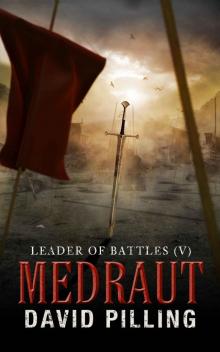 Medraut
Medraut Hardway
Hardway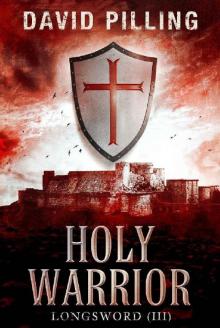 Holy Warrior
Holy Warrior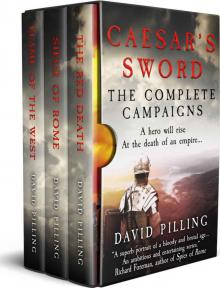 Caesar's Sword: The Complete Campaigns
Caesar's Sword: The Complete Campaigns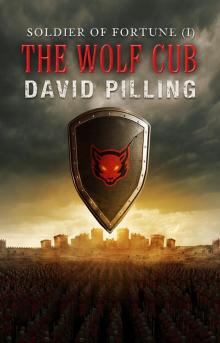 The Wolf Cub
The Wolf Cub Reiver
Reiver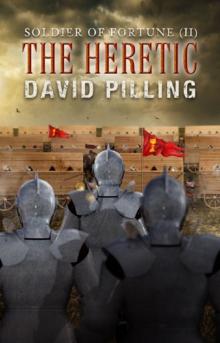 The Heretic
The Heretic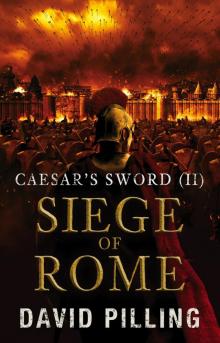 Siege of Rome
Siege of Rome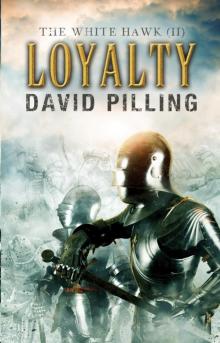 Loyalty
Loyalty The Path of Sorrow
The Path of Sorrow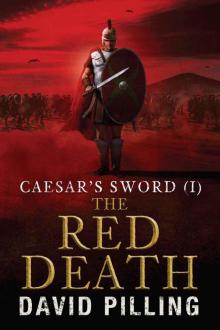 Caesar's Sword (I): The Red Death
Caesar's Sword (I): The Red Death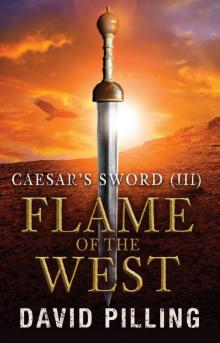 Flame of the West
Flame of the West The Best Weapon
The Best Weapon Sacrifice
Sacrifice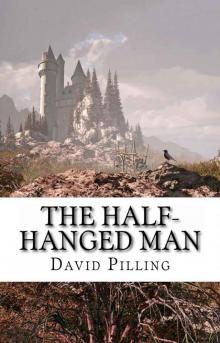 The Half-Hanged Man
The Half-Hanged Man